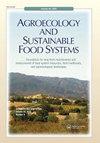Ethnobiological survey to determine the link between health benefits and qualities of Maasai traditional food system in Monduli, Arusha, Tanzania
IF 2.6
3区 农林科学
Q1 AGRICULTURE, MULTIDISCIPLINARY
引用次数: 0
Abstract
ABSTRACT Although Maasai’s traditional food system (TFS) is claimed to keep a low prevalence of metabolic diseases (MD), the link between its qualities and health benefits is not well established. An ethnobotanical survey was conducted to determine the link between health benefits and qualities of the Maasai TFS in Monduli, Arusha, Tanzania. The survey involved 21 Maasai TFS practitioners (MTPs) and revealed that the TFS has varieties of 19 dishes and a diversity of 78 flora species. The diversity of dishes and species had various potential health benefits: nutrition like Fe and vitamin A; therapeutic and protective effects against ailments including MD like gout, pressure, indigestion, and kidney disorders. Some food processing technologies (FPT) like nixtamalization, and meat roasting had potential protective effects against the MD. Cultural preferences and restrictions (CPR) for the food selection insured individual nutritional and health needs are met, and reinforcement of Maasai socio-structure and cohesion. Integrated protection and promotion measures are required to prevent unplanned nutritional transitions away from the TFS. Further research on the nutritional and medicinal roles of some FPT and the frequently used species could facilitate the protection and use of the TFS for the health benefits of especially marginalized people. SUMMARY Traditional food system (TFS) keeps a low prevalence of ailments including metabolic diseases (MD) in indigenous communities that uphold the cultural practices of their TFS. A variety of 19 Maasai foods (dishes) and a diversity of 78 flora species distributed in 63 genera and 39 families were parts of the Maasai TFS. Animal-based products, cereals, pulses, fruits, roots, and vegetables were the most frequently used food items in the Maasai TFS. Maasai food processing technologies FPT, a diversity of dishes and flora species, and cultural preferences and restrictions (CPR) developed for food selection constitute the qualities of the Maasai TFS. FPT, a diversity of dishes and flora species, and CPR are linked to health and cultural benefits. Graphical abstract在坦桑尼亚阿鲁沙Monduli进行民族生物学调查,以确定健康效益与马赛族传统食物系统质量之间的联系
摘要尽管马赛传统食品体系(TFS)被认为保持了较低的代谢性疾病(MD)患病率,但其质量与健康益处之间的联系并没有得到很好的证实。在坦桑尼亚阿鲁沙蒙杜利进行了一项民族植物学调查,以确定马赛TFS的健康益处和质量之间的联系。该调查涉及21名马赛TFS从业者(MTP),并显示TFS有19种菜肴和78种植物。菜肴和物种的多样性具有各种潜在的健康益处:铁和维生素A等营养;对痛风、压力、消化不良和肾脏疾病等MD疾病的治疗和保护作用。一些食品加工技术(FPT),如杀菌和烤肉,对MD具有潜在的保护作用。食品选择的文化偏好和限制(CPR)确保了个人的营养和健康需求得到满足,并加强了马赛社会结构和凝聚力。需要采取综合保护和促进措施,以防止无计划的营养从TFS转移。对一些FPT和常用物种的营养和药用作用进行进一步研究,可以促进TFS的保护和使用,以造福于特别边缘化人群的健康。摘要传统食品系统(TFS)在坚持其TFS文化习俗的土著社区中保持了低患病率,包括代谢性疾病(MD)。马赛TFS包括19种马赛食品(菜肴)和分布在39科63属78种植物。动物产品、谷物、豆类、水果、根和蔬菜是马赛TFS中最常用的食品。马赛食品加工技术FPT、菜肴和植物种类的多样性,以及为食品选择制定的文化偏好和限制(CPR),构成了马赛TFS的品质。FPT,一种多样的菜肴和植物物种,以及CPR与健康和文化利益有关。图形摘要
本文章由计算机程序翻译,如有差异,请以英文原文为准。
求助全文
约1分钟内获得全文
求助全文
来源期刊

Agroecology and Sustainable Food Systems
AGRICULTURE, MULTIDISCIPLINARY-GREEN & SUSTAINABLE SCIENCE & TECHNOLOGY
CiteScore
4.80
自引率
7.70%
发文量
73
期刊介绍:
Agroecology and Sustainable Food Systems is devoted to the rapidly emerging fields of agroecology and food system sustainability. By linking scientific inquiry and productive practice with transformative social action, agroecology provides a foundation for developing the alternative food systems of the future. The journal focuses on the changes that need to occur in the design and management of our food systems in order to balance natural resource use and environmental protection with the needs of production, economic viability, food security, and the social well-being of all people.
Agroecology and Sustainable Food Systems examines our current food systems from production to consumption, and the urgent need to transition to long-term sustainability. The journal promotes the study and application of agroecology for developing alternatives to the complex problems of resource depletion, environmental degradation, a narrowing of agrobiodiversity, continued world hunger, consolidation and industrialization of the food system, climate change, and the loss of farm land. The journal uses a food systems approach, and seeks experiences in agroecology that are on-farm, participatory, change-oriented, and backed by broad-based methodologies of sustainability analysis and evaluation.
 求助内容:
求助内容: 应助结果提醒方式:
应助结果提醒方式:


